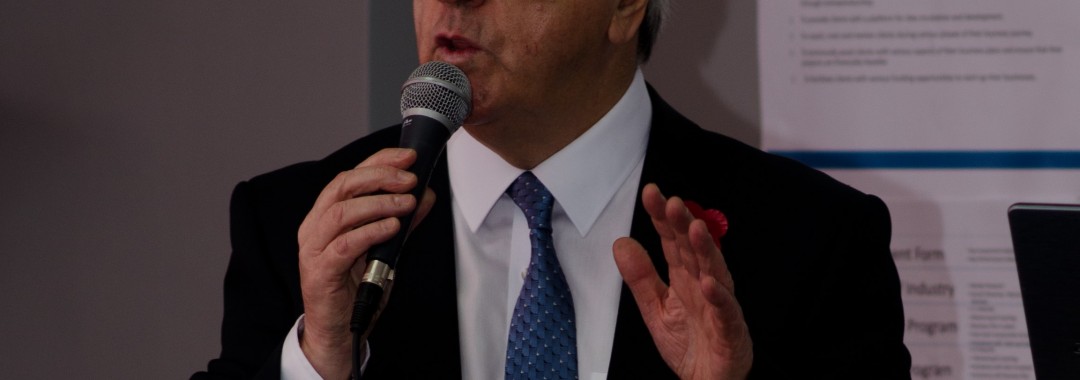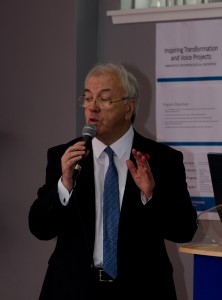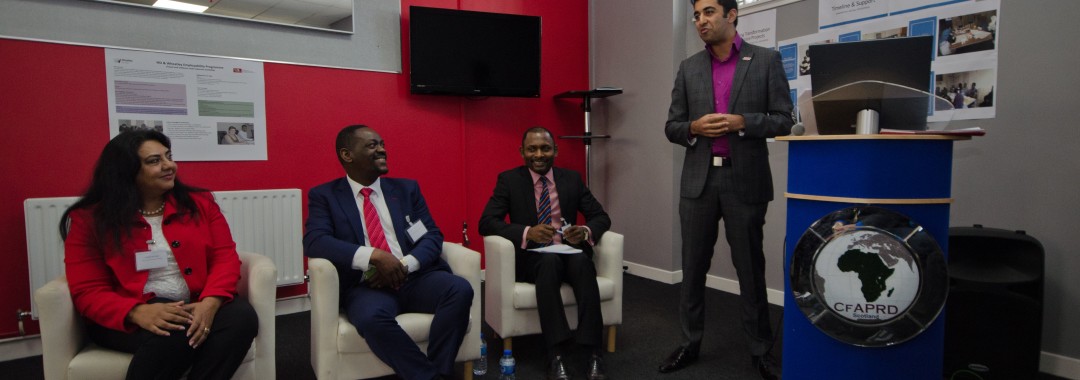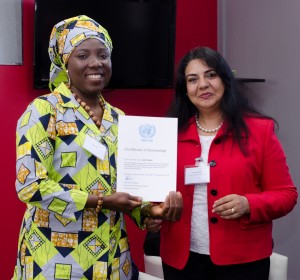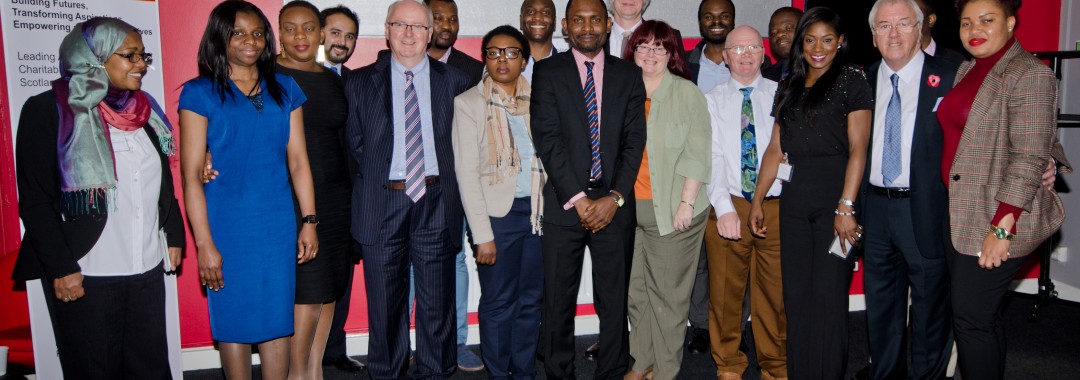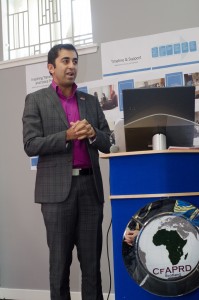By Adan K Mulata, National Defence College, Kenya
Introduction
The continent of Africa has immense potential as it has an extensive productive land mass, a large youthful population, strong social cultural bond; and abundant human and mineral resources. Despite its potential, the continent continues to experience conflicts and under-development while majority of its people are still suffering from socio-economic ills. Africa today has numerous unresolved issues such as poverty, bad governance, poor leadership, disasters, crisis of nation building, gender inequality, food insecurity and violent conflicts among many other ills affecting the people. In several countries of Africa, there is evident suppression of freedoms, the violation of human rights and dignity of their people. At the same time external actors both state and non-state particularly those from the developed countries have taken advantage of Africa’s sorry situation. Such actors tend to prey on Africa’s human, natural and intellectual resources for their self benefit without due regard for the people of the continent. The above situation is rooted and attributable to Africa’s past as the continent has suffered a great deal of political, societal, institutional and economic disruptions for several centuries and into the 21st century. There are several historic events that have negatively impacted on the current and future prospects of the continent and its people. They include; the slave trade, colonialism, post independence oppressive regimes, the cold war and sustained unfair international practices among others. There is need to reflect on these events for the purpose of analysis of their long term effect but also to enable develop a comprehensive approach to reverse their impact and allow genuine progress into the future for the people of Africa. Further the people of Africa and their leadership today have greater responsibility for the condition of the people of the continent and should therefore take control of the situation and chart a way forward out of this dilemma. The combination of the above issues also informs some of Africa’s complexities and present challenges including those of peace and security. This is against the background where leaders and institutions of the States in Africa have lacked the capacity and will to overcome the negative influences facing Africa and its people.
The threats to peace and security for states in Africa and the continent at large tend to emanate from both the internal and external environment. Hence issues of peace and security in the context of states in Africa can be understood from both the traditional approach which has its focus on defence from external aggression and human security dimensions among other possible approaches. Due to the present poor condition for the majority of people in Africa, of interest is the human security paradigm which is defined by the UN Commission on Human Security’s as “to protect the vital core of all human lives in ways that enhance human freedoms and human fulfillment” (Human Security Now, 2003, p4). The human security paradigm which is associated with the United Nations Development Programme (UNDP) 1994 Human Development Report on human security brings together the human elements of security, rights and development. Human security approach concerns the observance of human rights, good governance, poverty reduction, freedoms, provision of needs, access to education and health care. Such aspirations are relatively scarce for many people in the continent of Africa. Acceptably in Africa, most constitutions in several countries recognizes the need for security, observance of rights and safety of the individual and groups beyond the security of the state itself. A good example is Kenya constitution 2010 where chapter four on the bill of rights comprehensively integrates the key tenets of the human security paradigm. However, in practice for many states of Africa the achievement of human security remains a distant dream. Achieving human security is significant as it has direct implications for national security including the nature and survival of the state itself. The nature of the state of being either strong, weak or failed is crucial as it can have serious implications for security of its people and the continent at large. The combination of both the traditional approach to security and human security paradigm offers a strong basis for managing peace and conflicts issues in the continent. The combined approach will enable develop strategies which addresses threats in the internal and external environment of states and various regions of the continent which then positions the people of Africa for peace, stability and prosperity.
Broad look at Africa today
A broad look at Africa today is necessary to understand both its potential and present situation. The continent of Africa has a total of 54 states and a land mass of about 30.3 million km². Africa has a population of around 1.166 billion people which are estimates for 2015 (UNPF, 2009). The continent is divided into distinct regions such as north, east, west, central and south. Each region has unique character and challenges in socio-economic, peace and security but there are overlaps and commonalities which connects the entire continent. Further, a large part of the various regions of the continent are dominated by regional conflict complexes which makes the security of states interdependent. The majority of those distinct regions have developed into regional economic communities (RECs) such as the East African Community, Economic Community of West African States, Southern Africa Development Cooperation, Economic Community of Central African States and Arab Maghreb Union among several others. Despite over half a century of their independence, the reality for the majority of states in post independence Africa indicates that there has been minimal socio-economic progress which has led to the poor condition of their citizens. Thus most states in Africa have not had meaningful experiences of peaceful co-existence in the internal and external dimensions nor prosperity which in contrast is enjoyed by a large number of countries in other regions of the world. As earlier stated, the countries of Africa have had oppressive colonial rule, while in the post independence era they have experienced successive oppressive regimes, negative effects of the cold war era and continued unfair economic practices from developed countries that pursue their national interest. These issues when coupled with prescriptions of global institutions like the International Monitory Fund, World Bank and other donor organizations tend to negatively impact on states in Africa. There are numerous instances where wrong intervention strategies of both violent and non-violent nature by the developed countries have caused more harm than good for the people of Africa. Further, most states in Africa have immense challenges due to external pressures like globalization while at the same time experiencing political instability, persistent conflicts and war on terrorism among other complexities. Such situations tend to negate the possibility for peace, security and development in the continent which makes it difficult to progress towards achieving human security for the people of Africa.
States in Africa have the highest levels of poverty compared with other regions of the world. As at 2012, about 500 million (42.7%) people in sub-Saharan Africa live on $1.90 a day (World Bank Poverty Head Count Ratio, 2012). In contrast, the majority of countries in the continent are rich in natural resources and there is greater potential for other sectors like agriculture and industry to flourish. Indeed the immense resources of Africa have been substantial contributor to prosperity in some developed countries elsewhere in the world. For example one can question how developed countries such as France or Belgium would be like without the sustained extraction of resources from its former colonies in Africa. The first hurdle for states in Africa is to ensure that resources from the continent are primarily utilized for the well being of its people. The next major concern is the fragility of states in Africa where the majority of countries in the continent are either weak or failed states. The Fund for Peace Fragile index ranking, 2014 has 49 of the 54 countries of Africa between warning and very high alert with none in stable, very stable and sustainable categories. The fragility of states in Africa has its roots in the continents disruptive past and the challenges from both internal and external dimensions described earlier including failure of leadership and governance. This should concern all actors in Africa due to the possibility that a state can make progress overtime but easily slide back into crisis. There are several examples such as the cases of Libya, Ivory Coast, Central African Republic and Egypt among many others which despite several decades of development have regressed critically to near or failed state category.
Besides the above, states in Africa face other crises such as those of violent democratic transitions, corruption, transnational organized crimes, bad governance, youth bulge coupled with unemployment, insecurity (food, terrorism, disasters, health, and environment) and the overall safety for its people. According to the UN Population Fund, 2009 the population of Africa could double in size over the next course of 27 years thus by 2036. If Africa is unable to provide the basic needs and human rights for its people today, what if the population is doubled by 2036 as anticipated? There are some other questions one can raise when discussing Africa today and its future such as whether there can be an African renaissance or rebirth as envisaged by Thabo Mbeki?, can Africa rise to claim the 21st century? Or will the ideals of pan-Africanism be entrenched to enable the continent address its challenges? The answers to these questions are significant for a variety of reasons. If Africa is unable to rise and there is no renaissance or is unable to engage its own problems, this should worry us greatly. The concern being that the citizens of Africa will not have control of their future and also not benefit from its immense potential and resources. This implies that a third party with capacity to exploit Africa’s potential will benefit fully as the case has been in the past centuries leaving the continent’s people in an equally poor state, divided and in conflict for the next millennium and beyond. This direction is inappropriate for the people of Africa, which requires a serious rethink to chart a long term plan that can reverse the trend. Such a process will enable address some of the issues of peace, conflict and human security affecting the people of Africa which will be discussed in the next section.
Matters of peace, conflict and human security in Africa
In engaging matters of peace, conflict and human security in Africa, there are some key issues that emerge which can explain the reality for the people in states of Africa. In the internal dimension the issues include; the nature of leadership, governance, democratic transitions and internal conflicts. A combination of these factors in the internal environment triggers other forms of complexities such as negative ethnicity, the lack of national unity and inequitable distribution of resources. In the external dimension the core issues include unfair international practices such as prescriptions, negative effect of globalization and inappropriate pursuit of national interests by some states in developed world on Africa. Issues in both the internal and external environment will tend to converge making the challenges facing states in Africa complex and difficult to de-conflict. Acceptably there are variances in the degree of how each of these concerns impact on individual countries in Africa. For example Kenya and Tanzania are better placed than Somalia and South Sudan. The understanding of these emerging issues and a comprehensive effort in overcoming them will translate to the achievement of human security for the people of Africa.
Nature of Leadership in Africa
The leadership of states of Africa at all levels of government can be generally characterised as poor. As Ebegbulem observes despite its richness, the continent of Africa is battered by corruption and leadership crisis. The question of poor leadership has been a major impediment to development, peace and security for the people in the majority of states on the continent. Leaders in a large number of states in Africa are greedy for power, lack direction, want to enrich themselves, practice nepotism, have no respect for their national constitution and are corrupt. They also practice an inappropriate top down model of governance and are less concerned with the provision of needs and rights for the citizen who in the first place elected them to power. Such a scenario tends to divide communities along ethnic lines which then becomes a major source of instability for the state rather than harmony. Such leaders also prefer glossy reports from government bureaucrats in the comfort of city offices which fail to reflect the reality facing the citizens of a country. It is therefore important for the top most leadership of the state to set the standards as other leaders at lower levels and the rest of government will then easily conform. If the leader chooses to practice corruption, nepotism or fails to respect law and order, then the evil develops into the character of the other leaders in the state at all levels and the government itself.
For states in Africa, progress towards achieving human security for their citizen can mainly be driven by top leadership acting individually or collectively at national and continental level. At the same time it is critical for them to ensure citizen participation in every aspect of their lives including issues of governance. Several approaches can enable address this problem leadership crisis in Africa. First, the various arms of government through genuine separation of power should act independently to serve as a check and balance mechanism against excesses of leadership at all levels of government. Second is for the citizens to be educated and be made aware that they have voice to demand for their rights and participate in governance. The citizens once empowered should ensure their leadership at local and national levels do practice servant or transformational leadership and not to ‘lord’ over them. Third is inculcating national values and adopting a participatory form of government where the citizen’s rights are observed and they are able to check the excesses of leadership. Fourth is a regional and continental approach which needs to be put in place for the African Union and its Regional Economic Communities (RECs) to retain oversight of leadership in their member states. The regional and continental mechanisms should be enforceable to allow for actions in situations where a states top leadership fails to uphold such values or becomes a source of instability to the people and region. For example the African Union should not have remained quiet in the ongoing conflict situation arising from leadership struggles in Burundi. The continent’s leadership should ensure the spirit of constitutionalism is respected by leaders of states across the continent. Such situations of crisis require immediate action to avoid escalation of conflict to the region and beyond while attracting negative forces from the continental and beyond.
Governance practices in Africa
The practice of good governance is essential in alleviating various ills affecting society but most importantly it ensures effective and efficient use of resources which in turn improves the livelihood of the people. However, governments in most states in Africa have made little progress towards achieving good governance and associated principles such as transparency, accountability, participation, equality, equity and rule of law among others. Most governments in states of the continent have generally failed to ensure service delivery for their citizens. Corruption has become a chronic illness for the majority of states in Africa. Failure in governance and corruption undermines the capacity of the state to provide human security and development for its citizens; erodes values, creates mistrust between communities and leads to failure of service delivery. A combination of these factors will cause agitation, violence and conflicts which further leads to the suffering of vulnerable people particularly the poor, women and children. It is therefore not surprising that, over fifty years after independence, the majority of states in Africa are unable to provide services to their citizens. The citizens particularly in the rural areas are left to provide for themselves under harsh conditions where their very survival is not assured as they lack security and safety. This problem is exacerbated by the evident gap between the citizen, the state and their political and governmental leadership. The state authority and apparatus for service delivery have generally recoiled to the comfort of the city or major town centres. This leaves expansive stretches of ungoverned spaces within the territory of the state which are then occupied by bandits, armed gangs, terrorist and extremist who readily radicalize citizenry particularly the youth compounding the problem of insecurity and conflicts for the people in many states of Africa.
The convergence of poor leadership and bad governance poses a serious threat to state survival. It will therefore be instructive for leadership, institution of government and state apparatus to place emphasis on the wellbeing of the individual citizen for meaningful progress in Africa. Several key issues emerge in the attempt to resolve the issue of bad governance. First is the need to extend the reach of the state to re-occupy those ungoverned spaces to provide security, needs and rights for the citizens. Second is enhancing the effectiveness of government and adopting good governance practices. Third is prioritising the total elimination of corruption which has been a threat to survival of states in Africa. Finally the top leadership in the country should take full responsibility in reversing these trends. A good example is President Paul Kagame of Rwanda, who is transformational in nature, does not condone inefficiency in government, holds his officers accountable and acts decisively on corruption which has made the country develop and the conditions of the people markedly improved. Significant to this discussion is the model of governance practiced by states in Africa. The participatory bottom-up approach model of governance which responds to the initiative of the people will enable service delivery; meet the prioritized needs and the observance of human rights for the people. This is against the background of failure of other governance models of states in Africa. The constitution in several countries of Africa entrenches the right of citizens to be involved in all decision making in government at all levels which allows for this kind of participatory approach to governance. However, the practice of participatory development is yet to be entrenched in many states in Africa.
Equally important, there is need to scrutinize whether modern or liberal democratic practices should be interpreted or imposed on states in Africa purely in terms of its western definition. Acceptably there are common global values and standards which should inform the needs, rights and dignity of a person applicable in states. However, it would be instructive to consider domesticating for each country to have a unique blend of democratic practice and governance structures provided it serves the citizenry and meets the global threshold of rights and needs. Such structures could be a combination of several emerging models of governance including where applicable the traditional models, which will enhance acceptability and ownership of national decisions, development projects and programmes by the people. This is significant as it will anchor governance practices on both national and cultural values and connect citizens in the process of nation building which currently is a major challenge for states in Africa. This approach will particularly be effective in addressing social needs of the people such as the initiative of alleviating poverty through ‘one cow for every poor family’ in Rwanda and resolve conflicts using the traditional mechanisms rather than the commonly used militarized approach. Such a process minimizes opportunity for conflicts while allowing for peaceful coexistence, prosperity and progress of society.
War, Conflicts and Violent Extremism
The next major concern is war, conflicts and violent extremism which has tended to spread across various regions of Africa for a variety of reasons. First is political instability which for many states in Africa has been a constant problem since decolonization in 1960s with up to 61% of states in Africa having experienced instability at one point or another between 1960 and 2002 (Marshall M, 2005, p 11). During the cold war, proxy wars were fought on the continent by the two world powers. In the post cold war era, autocracies in Africa have declined while there has been an increase in the number of democratic regimes. This has brought the challenge of democratic transitions for many countries in Africa which has been cause of conflicts. Evidently, the clamour for power and resources including dynamics of democratization has led to an upsurge in inter-communal violence for many states in Africa.
Second are conflicts which according to Project Plough Shares armed conflicts report 2014, in 2013 alone there were a total of 28 armed conflicts in 25 countries across the world. Twelve (12) of the armed conflicts were in the continent of Africa which translates to 43% of conflicts in the world. Put differently, 24% of countries in the continent of Africa are identified as being in a state of armed conflict. Indeed a scrutiny of most states in Africa today will indicate the existence of serious threats to their survival from either the internal or external environment. The violent conflicts have had devastating effects such as death, genocide, injury, violations of human rights and the destruction of property including the deprivation of the means of livelihood for the affected communities. Ethnicity including the issues of identity has been a major source of conflict and wars across Africa. An example is the Rwanda genocide of 1994 where in about 100 days over 800,000 people were massacred. In some instances like that of Somalia, Libya, Central African Republic and South Sudan, combinations of those threats have led to the collapse of the state. States in Africa have to identify such threats to their survival and develop comprehensive long-term plans acting individually or collectively.
Third is the issue of territorial borders which were arbitrarily drawn by the colonial powers coupled with the discovery of resources in Africa has been a source of wars and conflict. Though the problem of borders is highly complex and sensitive, the African Union (AU) has made a bold move by having an AU border policy and urged its member states to demarcate their borders by 2017. Ambitious and complex as this may seem, the states in Africa have no choice but to conduct this exercise and where disputes arise, they should be resolved using non-violent and peaceful means. An example is how Nigeria and Cameroon resolved their border dispute over the Bakassi Peninsula in 2002 by seeking the intervention in the International Court of Justice (ICJ) to determine ownership. In this case both countries accepted the outcome of the ICJ decision of awarding the peninsula to Cameroon. The AU and Regional Economic Communities (RECs) can mandate continental and regional courts such as the African Court of Justice, Human and Peoples Rights or the East African Court of Justice for EAC and the continental organ before recourse to the International Court of Justice.
Fourth is terrorism which is a global phenomenon that has been the cause of concern to many states in Africa. Data from Global Terrorism Index 2014 which shows the top 50 countries of the world according to their terrorist activities has 18 of the countries from Africa. Terrorist attacks by groups such as Al Qaeda, Boko Haram, Al-Shabaab and their offshoots in countries across various regions of Africa have been a serious source of insecurity, destruction and death which is an impediment for socio-economic development of the states in the affected regions. More recently, the Islamic State terror group continues to cause havoc across numerous regions of the world with many states in Africa suffering its brunt. Related to the issue of terrorism are the radicalization of the youth and some segment of the population in some states towards violent extremism. To minimize this, there is need to engage anti-radicalization measures, educate and create employment for the youth.
Finally, additional to the above, the discovery of oil and gas and other precious minerals are likely to compound the potential threats for countries in the continent. The discoveries will make Africa become the focus of other major global actors who will religious pursue their national interests at the peril of states in Africa. There is also the dimension of resource curse where conflicts and wars are caused in the contestation over mineral exploitation, sharing and its management. There is need to guard states in Africa against such one sided pursuit of individual interest by external actors to maximize the benefit for the people of Africa. At the regional and continental level, there is need to have legal regimes to manage resources and conflicts that emanates from them.
In the area of war, conflict and violent extremism, there are several steps which can enable manage the issues of peace and security. First is all states in Africa should prepare national security strategies. The AU and RECs are to equally develop specific plans to address issues of continental security concerns. The national and continental long range plans should dovetail each other for complementarity. Second is to share intelligence in all spheres of threats affecting states and regions of Africa. Indeed where such intelligence sharing is undertaken effectively, security forces have successfully pre-empted possible attacks of terror or prevented conflicts. Third is to ensure the envisaged continental early warning system, RECs and with link to national institutions be operationalized. A combination of such steps can enable enhance Africa’s responsiveness to threats and also enable it to be resilient to risks. Independence, sovereignty and progress for states in Africa can only be achieved if the problems of war, conflict and violent extremism are overcome.
Unfair International Practices
This section concerns the global environment in which Africa operates and brings together a wide range of factors in the global arena that influences the dynamics of events in the continent. The unfair international practises concerns negative effects of globalization, international trade, arms trade, resource exploitation, bilateral and multilateral donor aid/loans and interventions in Africa. First there is persistent violence in several states in the continent due to wrong external intervention strategies which has tended to negate the possibility of their development. Such violence includes; events such as the Arab spring which began around December 2010 that affected Tunisia, Libya and Egypt in Africa and many other states across the Arab world. Though the crisis seemed like internal uprising it had a larger external component allegedly orchestrated and triggered by countries primarily from the developed West. In all the three cases those wrongful intervention strategies led to the collapse or near collapse of the affected countries. Such negative external manipulation of the domestic environment can have implications for stability of the already fragile states in Africa.
Second is the continued exploitation of resources of the continent which tends to enrich other developed states while there is little or no benefit for the people of Africa. There are cases where highly impoverished countries such as Democratic Republic of Congo, Liberia and Sierra Leone among others being perennially in conflict which are attributed to their mineral resources which are exploited by some developed countries such US, UK, France and Belgium among several others. Third is the suffering of people from Africa due to repayment of foreign loans/debts and prescriptions or conditionality from institutions like International Monetary Fund and World Bank which are unsustainable. Fourthly is the use by developed countries of unscrupulous methods including placing unwarranted travel advisories on several countries in Africa under the guise of terrorism. These unwarranted approach negatively impacts directly on tourism, investment and economic growth which further impoverishes the people of Africa. For example during the visit of President Obama to Kenya 24-26 July 2015, the CNN reported that his visit was to a country which is a “hotbed of terrorism” such media projections though baseless will have negative consequences for the target country. Such a move gives a direct endorsement of the people who perpetrate the problem of terrorism at the detriment of the security of the state. Other issues such as trade barriers both tariff and non-tariff continue to hurt the people of Africa. These factors confirm that the causes of conflicts and issues of human rights are violated by several structural issues in the international arena. Indeed it is evident that states in Africa are mostly disadvantaged when it comes to the numerous dynamics in the global arena. Such complex scenarios require collective effort of states in Africa, civil society and lobbying by like minded groups and ‘think thanks’ to correct some of those structural injustices which negatively impact on the countries of Africa.
Finally the intervention or failure to intervene by the international community in diverse conflicts or crisis situations has had negative consequences for states in Africa. An example is the March 2011 NATO intervention in Libya. Human Development Report 2014 ranked Libya which was then under Muamar Gaddafi, as number 55 out of 187 countries in the world. Its people enjoyed high human development index of 0.784. However, after the death of Gaddafi, today Libya competes for the bottom position with countries such as Somalia and South Sudan after the North Atlantic Treaty Organization led international coalition intervention. Further the majority of citizens in Libya are today in the hands of warlords, criminal gangs and militia; they lack basic needs and their rights are violated. Further the spill over effect of the collapse of Libya has impacted widely in the region on the majority of states in North and West Africa. The flourishing of terror groups such as Boko Haram and Islamic State in the region has been attributed to this spill over effect of the failed Libyan intervention and eventual collapse of the state. The Libyan case is a clear example of wrong intervention strategies by developed countries of the West on states in Africa which had drastic consequences. It would be prudent for any form of intervention in conflicts in Africa to be undertaken in a manner that ensure and accommodates the unique nature of the people of Africa. This means such an intervention should follow wide consultation with continental actors.
The nature of interaction between Africa and the rest of the world should place genuine concern for the future of the continent and its people. The developed countries will pursue their national interests with little or no consideration for the people of Africa causing conflicts and instability in many countries of Africa. In such a scenario, conflicts increase and development stalls while at the same time enabling criminal elements such as terror groups and transnational organized crimes to flourish making a mockery of statehood for many countries in Africa. Based on these experiences, countries which intervene in situations in the continent should pursue an agenda that contributes to a stable, peaceful and prosperous Africa. An approach which can deliver such an aspiration for the continent is the ongoing agenda for regionalism in Africa.
Agenda of Regionalism in Africa
The above discussion has demonstrated that the threats facing states in Africa emanates from both the internal and external dimensions which traditionally extend beyond the realm of security of an individual state. Further, the economies of states in Africa are small, isolated and weak to survive and prosper individually. The need for meaningful development and security for the people of the continent can therefore be realised through the continent’s regional integration agenda rather than by purely individual states. At its inception in 1963, the OAU had a strong agenda of ‘pan-Africanism’ which was propagated by founding fathers such as President Kwame Nkurumah, Julius Nyerere and Jomo Kenyatta among others. The regional integration agenda for Africa’s unity by its sub-regions is evident through several instruments such as the Lagos Plan of Action 1980, Abuja Treaty 1991 and the Constitutive Act of the African Union of 2000 and the eventual launch of African Union in 2001 among others. The Abuja treaty of 1991 crystallized the aspirations of the Lagos Plan of Action of establishing an African Economic Community with Regional Economic Communities as its building blocks. As De Mello and Tsikata observe “The RECs were and continue to be the glue that will cement African unity” (De Mello and Tsikata, 2014, p4). In my view this is where the future of Africa lies in ensuring success of its continental agenda for regionalism.
In other fronts there have been several initiatives to develop and secure states in Africa albeit, with minimal progress. Examples include the structural adjustment programmes and related strategies of the 1980s and early 1990s which all failed. More recently there were expectations with the launch of the United Nation’s eight Millennium Development Goals (MDGs) in the year 2000 which were to be achieved by 2015. The failure to achieve the MDG goals led to the international community developing the Sustainable Development Goals (SDGs) whose goals 17 goals were adopted at the General Assembly in September 2015. It seems that countries in Africa individually and collectively are chasing ‘mirages’ in the desert under difficult circumstances posed by the issues discussed earlier in the internal and external environment. It is about time for real consideration to be made in achieving tangible progress for the people of Africa in every respect.
The African Union Agenda 2063 – ‘the Africa We Want’, which was launched in 2013, earlier introduced, takes notes of development in the continent in its first fifty years since the inception of the OAU in 1963 and looks ahead to the next fifty years. It takes into account the continent’s earlier plans and places emphasis on the critical role of Regional Economic Communities (RECs) as building blocks for continental unity thus being key actors in steering the continent’s agenda. It would be useful to highlight the seven aspirations outlined in African Union, Agenda 2063 (Agenda 2063, 2014, p2 – Popular version). First is ‘a prosperous Africa based on inclusive growth and sustainable development’. Second is ‘an integrated continent, politically united and based on ideals of pan-Africanism and the vision of Africa’s renaissance’. Third is ‘an Africa of good governance, democracy, respect for human rights, justice and the rule of law’. Fourth is a peaceful and secure Africa’. Fifth is ‘an Africa with a strong cultural identity, common heritage, values and ethics’. Sixth is ‘an Africa where development is people-driven, unleashing the potential of women and youth. Finally, ‘Africa as a strong, united and influential global player and partner’. Specific aspects and targets are outlined under each aspiration that shows a broad road-map of achieving ‘the Africa we want’ by 2063. These seven aspirations of the African Union contained in Agenda 2063 – ‘the Africa we want’ needs to be pursued for its achievement with commitment and zeal by states and their leadership. Agenda 2063 also re-dedicates itself to the pan-African vision of an integrated, prosperous and peaceful Africa, driven by its own citizens and represents a dynamic force in the global arena (Agenda 2063, 2014, 2nd edition, p1). States of Africa pledge to act together towards achieving the seven aspirations which are outlined in agenda 2063 (Agenda 2063, 2014, 2nd edition, p2). The fourth aspiration is ‘to have a peaceful and secure Africa’. This aspiration targets that by 2020 all guns will be silent, mechanisms for peaceful resolution of conflicts will be functional at all levels and by 2063 Africa will have the capacity to secure peace and protect its citizens (Agenda 2063, pp 6-7). The commitment of leaders in the continent is demonstrated by the call to action recognizing that Africa in 2015 stands at crossroads and shows their determination to transform the continent and ensure irreversible and universal change of the Africa’s conditions.
All the seven aspirations in AU Agenda 2063 are linked and mutually re-enforcing, hence achieving them will therefore enable Africa to take global leadership in the next century. Through Agenda 2063, it seems leaders of states in Africa are acknowledging that not much has been achieved over the first 50 years of their independence; hence they need to do something in the next fifty years. Despite the exemplary aspirations and concerns expressed in the document, there seems to be little progress so far except for the launch of the initial ten year plan in June 2015. As previously experienced such good plans without commensurate actions will take Africa nowhere. The AU leadership should recognize that the rest of the world is equally having aspirations hence are pursuing their national and regional interests religiously which means that states in Africa do not have the luxury of time. Therefore concrete steps are required which should be coupled with corresponding actions to be orchestrated immediately to fast track Africa’s progress in all spheres. The plan could be run like a military campaign with nerve centres at continental, regional and national levels to monitor progress towards the aspirations and targets stipulated in Agenda 2063 in a more frequent and dramatic manner.
Central to the anticipated turn round for the continent are the eight regional economic communities and similar mechanisms which are important building blocks in forming the anticipated African Economic Community as envisaged in Abuja Treaty of 1991. The RECs form an important platform that connects States in Africa through continental initiatives on energy, power, roads and promotes trade between countries across Africa. The AU Agenda 2063 envisages an increase in intra-Africa trade to about 50% from the current 11 % which will be on better terms as opposed to trade elsewhere in a globalized world. Such an anticipated growth will require interaction between states in Africa, allows for contact between groups across the continent, build relationships and creates connectedness among the people of Africa. An example is the East African Community which has five member states, collective size of 1.82 million km², population of 143.5 million people and GDP of US$110 billion (EAC Website). The five EAC partner states interact substantially to the extent that any situation between them can be resolved through negotiation and not war. A combination of such factors reduces tension between states and minimizes likelihood for war or conflicts while giving opportunity for peace. However, as the RECs consider forming federations such as that of EAC, there is need to have strong institutions which will ensure stronger institution that can impact beyond matters of trade.
A critical component that can allow independence and security for the continent of Africa is its capacity to resolve its own problem using own resources. Leadership in Africa have recognized this fact and established an important conflict management tool; the African Peace and Security Architecture (APSA) which was established in 2001. The African Peace and Security Architecture have five pillars: the Peace and Security Council, the Panel of the Wise, the AU Peace Fund, the Continental Early Warning System and the African Standby Force. APSA has five regional standby forces comprising the East African Standby Force, ECCAS, ECOWAS, SADC and North African Regional Capability. Working with the RECs, APSA forms an important step in enabling the continent to take independent control of resolving conflicts in Africa. The difficulty being experienced is the challenges of funding hence its sustainability could pose a challenge. Similar initiatives such as New Partnership for Development and the African Peer Review Mechanism are meant to address problems of governance, leadership and corruption. NEPAD is also geared to improving governance in states and the living conditions for the people of Africa and reduce their poverty. The success of such home grown intervention mechanism for ‘Africa by Africa’ if credibly sustained will be central in the search for peace and prosperity for states in Africa.
Conclusion
States in Africa at both the individual and continental levels must genuinely embrace the right practice in engaging the above factors to bring about meaningful change. There is need for political will from Africa’s leadership to ensure the realization of all aspirations at continental, regional and national levels. A concerted effort needs to be put in place by state, international organizations, civil society, the corporate and the people of Africa themselves to have the determination and will to ensure positive change for the continent. Failure to take such a stand will lead to the continuity of oppression, suffering and exploitation for states in Africa. Without the political will and determination to run with the ideals stipulated above, there will be no hope for Africa and its people. The bottom line is for leaders in Africa of all spheres must lead to the process of reversing the historic poor condition of its people. Other people of goodwill can then support their initiative for a better and progressive Africa.
Abbreviations
APRM – African Peer Review Mechanism
APSA – African Peace and Security Architecture
AU – African Union
CNN – Cable News Network
EAC – East African Community
ECCAS – Economic Community of Central African States
ECOWAS – Economic Community of West African States
ICJ – International Court of Justice
MDGs – Millennium Development Goals
NATO – North Atlantic Treaty Organization
NEPAD – New Partnership for African Development
OAU – Organization of African Unity
RECs – Regional Economic Communities
SADC – Southern Africa Development Cooperation
SDGs – Sustainable Development Goals
UNDP – United Nations Development Fund
UNPF – United Nations Population Fund
References
African Union, 2013, Agenda 2063 – ‘the Africa We Want’, agenda2063.au.int/
De Melo J. and Tsikata Y., Regional Integration in Africa: Challenges and prospects, WIDER Working Paper 2014 /037, 2014, Helsinki, Finland.
Ebegbulem C. Joseph, Corruption and leadership crisis in Africa: Nigeria in Focus, International Journal of Business and Social Sciences Vol.3 No 11: June 2012, pp 221-227
Fund for Peace Fragile States Index Ranking, 2014, library of fund for peace organisation, fsi.fundforpeace.org.
General data on EAC states, EAC Website, www.eac.int
Human Development Report, 2014, United Nations Development Programme, hdr.undp.org/en/2014–report
Human Security Now, 2003, Final report of the United Nation’s Commission on Human Security, www.un.org/humansecurity/content/human–security–now.
Kenya Constitution, 2010, National Council for Law Reporting, Nairobi.
Marshall M, 2005, Conflict trends in Africa, 1946-2004 a macro-comparative perspective, Virginia
Project Plough Shares, Armed Conflicts Report 2014, www.ploughshares.ca.
United Nations Development Programme (UNDP), 1994, Human Development Report on Human Security, Oxford University Press.
United Nations Population Fund, Report on State of World Population 2009, https://www.unfpa.org/
World Bank Poverty Head Count Ratio, 2012, http://povertydata.worldbank.org/poverty/region/SSA

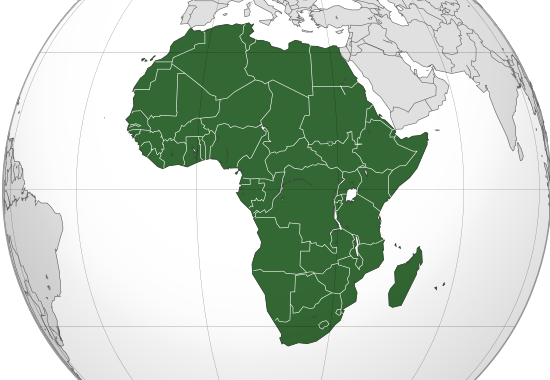

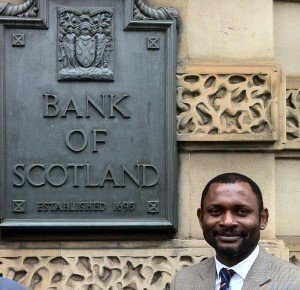 The United Nations Conference for Trade and Development in Geneva have appointed AFS Chief Executive Beltus Etchu to their Awards panel who will select winners for the Empretec Women in Business Award 2016.
The United Nations Conference for Trade and Development in Geneva have appointed AFS Chief Executive Beltus Etchu to their Awards panel who will select winners for the Empretec Women in Business Award 2016.
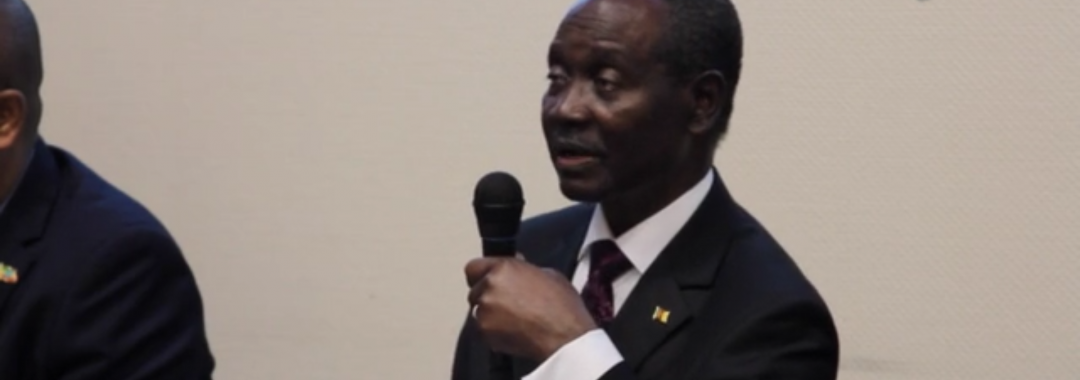
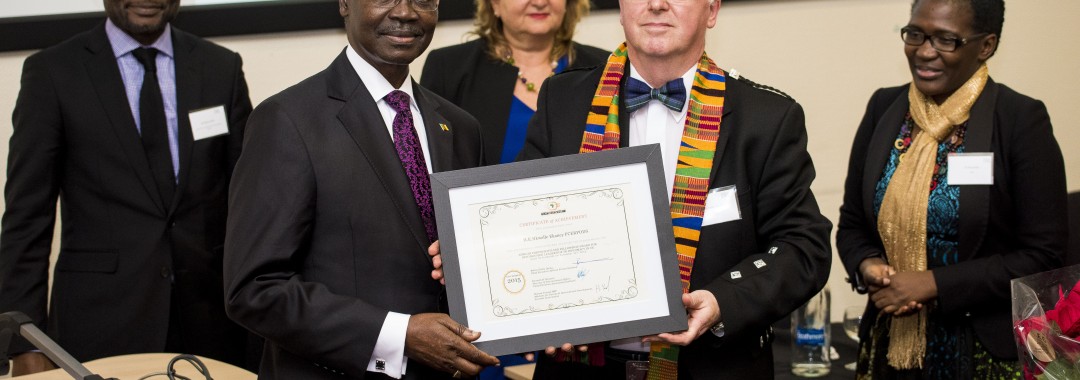
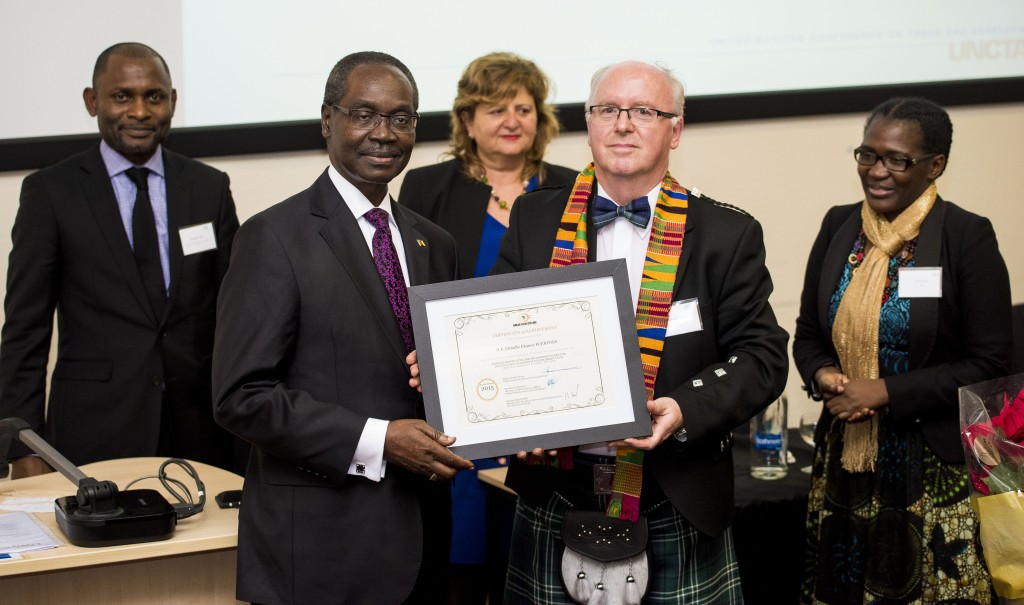
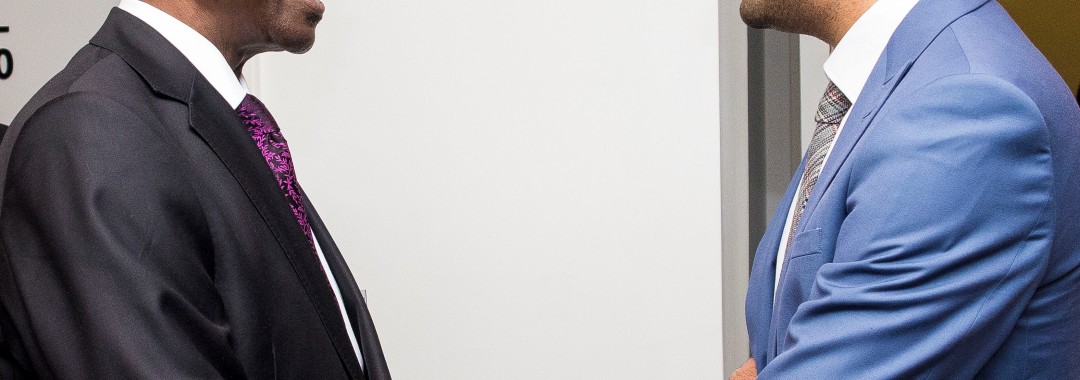
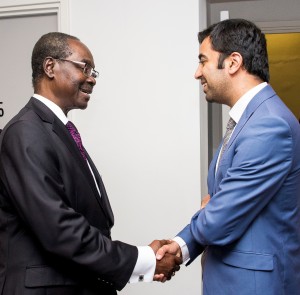 AFS were honoured to receive a visit from His Excellency Nkwelle Ekaney, High Commissioner of Cameroon during his first official visit to Scotland. His Excellency publically congratulated AFS for our sterling work on behalf of the diaspora throughout the UK and our endeavours to initiate trade between the UK and Cameroon. Scottish International Development Minister MSP Humza Yousaf welcomed the HIgh Commissioner to AFS and Scotland.
AFS were honoured to receive a visit from His Excellency Nkwelle Ekaney, High Commissioner of Cameroon during his first official visit to Scotland. His Excellency publically congratulated AFS for our sterling work on behalf of the diaspora throughout the UK and our endeavours to initiate trade between the UK and Cameroon. Scottish International Development Minister MSP Humza Yousaf welcomed the HIgh Commissioner to AFS and Scotland.